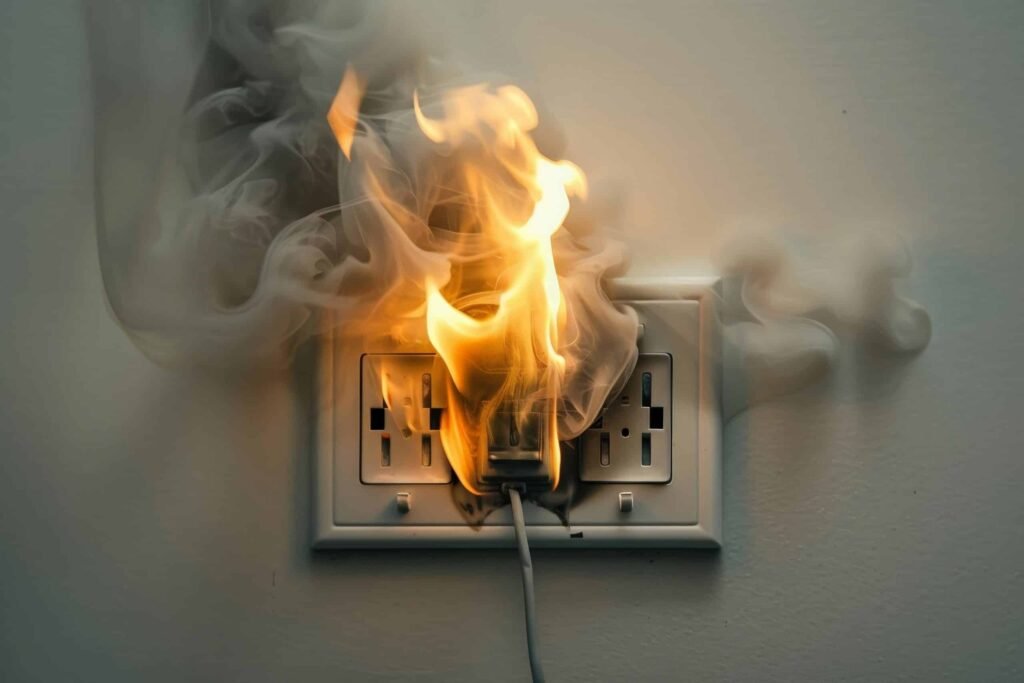When we think about fire safety, most of us picture smoke alarms, different types of fire extinguishers, or evacuation plans. Those are all essential, but here’s the thing: fires don’t usually start from the “big” risks we’re trained to expect. More often, they’re sparked by little everyday habits we barely think about. The kind of routines that feel harmless… until they’re not.
So let’s take a closer look at some of the most common — and most surprising — fire hazards hiding in plain sight at home, and what you can do to eliminate them without turning your life upside down.
1. Charging Devices Overnight
It’s tempting: you plug in your phone or laptop before bed and wake up to 100% battery. But constant overnight charging can overheat devices, especially if they’re under pillows, on beds, or covered by clothes. Add a cheap cable or faulty adapter into the mix, and you’ve got a recipe for trouble.
The fix: Use quality chargers from reputable brands, and charge devices on hard, flat surfaces. Better yet, charge them during the day when you’re around to notice if something’s wrong.
2. The Love Affair with Extension Cords
We’ve all done it: plug the heater, lamp, and laptop into the same extension cord and call it good. But overloaded cords are a major cause of residential fires. Even if it doesn’t trip your breaker, the heat buildup inside that strip could be dangerous.
The fix: Stick to one major appliance per outlet strip, and don’t “daisy chain” extension cords. If you constantly run out of outlets, it’s time to install more — safely.
3. Candles (Yes, Even the Fancy Ones)
Candles feel harmless, especially the little tealights in glass holders. But left unattended or placed too close to curtains, books, or holiday decorations, they’re one of the most common culprits in household fires.
The fix: Keep candles at least a foot away from anything flammable, and never leave them burning when you leave the room. If you love the ambiance, consider battery-powered alternatives that give the same cozy vibe without the risk.
4. Forgotten Kitchen Appliances
It only takes a second to get distracted — a phone call, a knock at the door — and suddenly that frying pan of oil is smoking like a chimney. Kitchen fires happen fast, and leaving appliances like toasters, coffee makers, or air fryers plugged in only adds to the risk.
The fix: Unplug small appliances when not in use. And when cooking, adopt a simple rule: if the stove or oven is on, you stay in the kitchen.
5. Laundry Lint: The Sneakiest Firestarter
Here’s one most people overlook: lint buildup in dryers is highly flammable. Combine that with heat from the machine, and you’ve got a dangerous combo. Even a clean lint trap won’t save you if buildup collects in the vent hose.
The fix: Empty the lint filter after every load, and deep-clean the vent regularly. It’s boring, yes — but it’s one of the easiest, most effective fire prevention steps you can take.
6. Space Heaters in the Wrong Place
Space heaters are cozy lifesavers in the colder months, but they’re also notorious fire hazards when placed near beds, curtains, or laundry piles. Even a little knock-over can lead to disaster.
The fix: Use heaters with built-in safety features like automatic shut-off, and always give them three feet of clearance in every direction.
7. Clutter That Blocks Escape Routes
Not exactly a “firestarter,” but worth mentioning: cluttered hallways and blocked doors won’t cause a fire, but they will make it harder to escape one. And in a real emergency, seconds matter.
The fix: Keep walkways and exits clear — especially in high-traffic areas like the kitchen or near stairways.
A Safer Routine, One Habit at a Time
Fire safety doesn’t always mean overhauling your whole lifestyle. More often, it’s about tweaking the small habits that quietly pile up risk over time. It’s not all about endless checks, inspections, and fire extinguisher servicing. Charge smarter. Clean your dryer. Move that space heater.
The beauty of addressing these “hidden” hazards is that they’re easy wins: quick fixes that can dramatically reduce the chance of an accident. And once you’ve tackled them, you’ll sleep a little easier knowing you’ve closed the door on some of the most common everyday fire threats.

